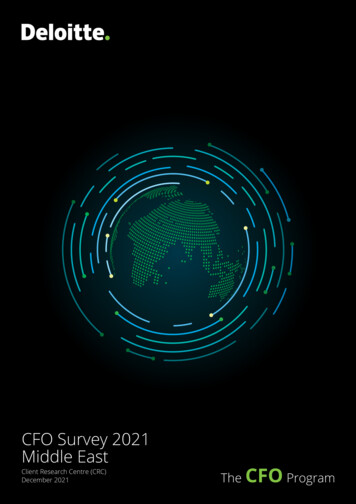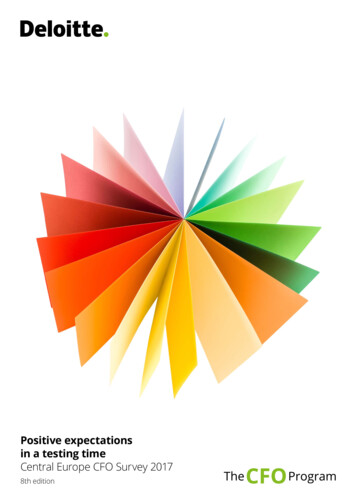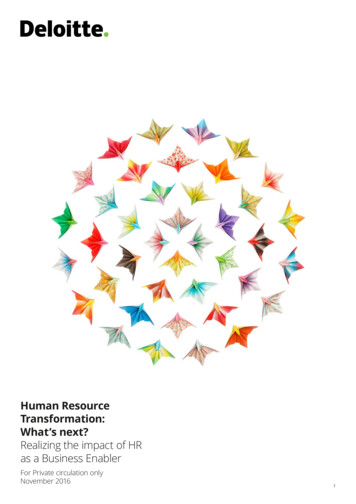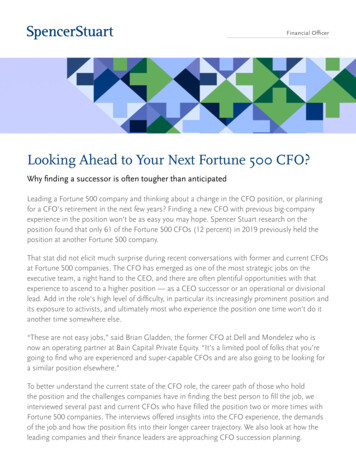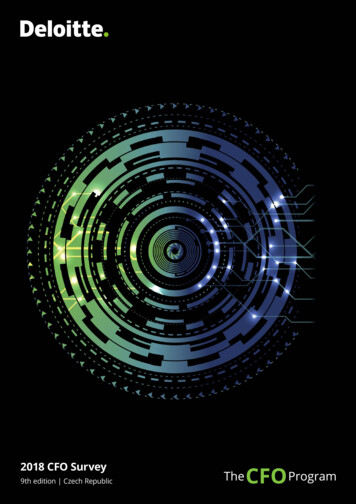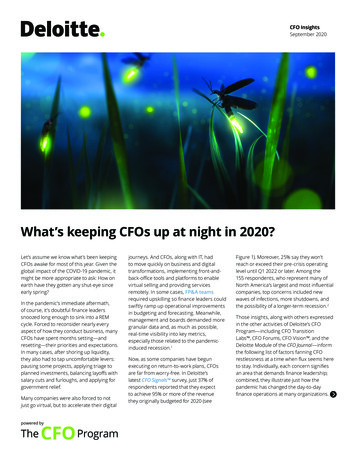
Transcription
CFO InsightsSeptember 2020What’s keeping CFOs up at night in 2020?Let’s assume we know what’s been keepingCFOs awake for most of this year. Given theglobal impact of the COVID-19 pandemic, itmight be more appropriate to ask: How onearth have they gotten any shut-eye sinceearly spring?In the pandemic’s immediate aftermath,of course, it’s doubtful finance leaderssnoozed long enough to sink into a REMcycle. Forced to reconsider nearly everyaspect of how they conduct business, manyCFOs have spent months setting—andresetting—their priorities and expectations.In many cases, after shoring up liquidity,they also had to tap uncomfortable levers:pausing some projects, applying triage toplanned investments, balancing layoffs withsalary cuts and furloughs, and applying forgovernment relief.Many companies were also forced to notjust go virtual, but to accelerate their digitalCFO Programpowered byThejourneys. And CFOs, along with IT, hadto move quickly on business and digitaltransformations, implementing front-andback-office tools and platforms to enablevirtual selling and providing servicesremotely. In some cases, FP&A teamsrequired upskilling so finance leaders couldswiftly ramp up operational improvementsin budgeting and forecasting. Meanwhile,management and boards demanded moregranular data and, as much as possible,real-time visibility into key metrics,especially those related to the pandemicinduced recession.1Now, as some companies have begunexecuting on return-to-work plans, CFOsare far from worry-free. In Deloitte’slatest CFO Signals survey, just 37% ofrespondents reported that they expectto achieve 95% or more of the revenuethey originally budgeted for 2020 (seeFigure 1). Moreover, 25% say they won’treach or exceed their pre-crisis operatinglevel until Q1 2022 or later. Among the155 respondents, who represent many ofNorth America’s largest and most influentialcompanies, top concerns included newwaves of infections, more shutdowns, andthe possibility of a longer-term recession.2Those insights, along with others expressedin the other activities of Deloitte’s CFOProgram—including CFO TransitionLabs , CFO Forums, CFO Vision , and theDeloitte Module of the CFO Journal—informthe following list of factors fanning CFOrestlessness at a time when flux seems hereto stay. Individually, each concern signifiesan area that demands finance leadership;combined, they illustrate just how thepandemic has changed the day-to-dayfinance operations at many organizations.
What’s keeping CFOs up at night in 2020?Figure 1. What is your 2020 revenue compared to original expectations?How do you expect your calendar year 2020 revenue to compare to what you budgeted before thepandemic? Percent of CFOs selecting each range of budgeted nancial Services15% to 34%1% to 14%11%8%10%8%50%39%95% or higher of budgeted16%11%33%50%30%8%8%3%9% 3% armaServices2%1%8%7%36%75% to 94%9% 4% 9%55% to 74%9%35% to 54%0% and belowSource: CFO Signals, Q3 2020, CFO Program, Deloitte LLP.1. Rationalizing globalization. Supplychain disruptions, sparked by the pandemic,have led many finance leaders to cast afresh, critical eye on the role and impactof their global ecosystem. Deloitte’s CFOSignals for Q2 2020 found that nearly 40%of surveyed CFOs expect their supplychains to be more diversified post-crisis.3How significantly could options, such as“onshoring” or “nearshoring,” reduce risksand costs? As they reconfigure their supplynetworks to boost resilience, CFOs maydecide to swap their extended supplychains for more regional versions. Theymay also accelerate their investment inautomation, adding online risk-sensing toolsto increase traceability and transparency,and illuminating the entire supplychain ecosystem. Companies that haveexperienced production disruptions asa result of locating factories in China andelsewhere may see the pandemic as anopportunity to de-risk and diversify.2. Leveraging liquidity. When thepandemic first hit, liquidity and cash flowbecame paramount, with a number ofcompanies scrambling to shore up debt anddiversify financing sources. For companieswhose sturdy balance sheets withstood thepandemic’s onset, however, now may be the2time to raise debt, deploying funds to targetincreasingly affordable acquisitions (see“In the coming economy, M&A strategiesemerging as a big deal,” CFO Insights, June2020) in areas ripe for consolidation. CFOsmay also decide to divest assets to raisecapital for transformational transactionsthat can catapult them over their rivals.Companies still in need of liquidity, however,may decide to continue focusing on cashflow, reducing such costs as real estate (see“Space exploration: CFO considerations forstrategically evaluating real estate,” CFOInsights, July 2020).3. Accelerating digitalization. In the Q32020 CFO Signals survey, CFOs’ most-citedstrategic shift was toward more and longerterm remote work, but many also citedan acceleration of business digitalization.In fact, one respondent wrote that thecompany “had good digital capabilities, butexpected to use them 10% of the time; nowit’s 75%, and going-forward will probably be50%.” The crisis has also served as a catalystfor the finance function to expand its ownuse of automation, including in the annualplanning process and FP&A. As CFOsevaluate the range of new investments, theyneed to consider technology that not onlyallows for better business outcomes, butalso maintains data privacy and bolsterscybersecurity measures. Moreover, astheir companies develop capabilitiesfor digitalizing familiar activities (such asinvestor days, board meetings, and otherevents), CFOs will also have to evaluate theneed to invest in next-level technologies,such as AI-fueled analytics and RPA.4. Preparing for a long-term recession.For the first time in the history of CFOSignals, which dates back to 2010, there isa larger proportion of CFOs rating China’seconomy as good and expecting conditionsto be better there a year from now thanthose expressing a similar sentiment forNorth America. In the most recent survey,7% of CFOs rate the North Americaneconomy as good; 60% rate it as bad. Only43% expect conditions to be better a yearfrom now. That contrasts with the 22% ofCFOs who rate China’s economy as goodand the 47% expecting conditions to bebetter there a year from now. Still, that’snot the survey’s most discouraging news.Concerns among CFOs that the pandemicmight trigger a longer-term recession alsorose this quarter—and they aren’t the onlyones. The World Bank predicts that theglobal economy will endure its deepestrecession since WWII ended, with GDPcontracting 5.2% this year.4
What’s keeping CFOs up at night in 2020?5. Sustaining a virtual culture. Formany finance departments, the COVID-19pandemic introduced virtual work to afunction that traditionally required allhands on deck. It is turning out to be a notso-short-term experiment (see “Remotecontrol: How finance works, not where,matters most now,” CFO Insights, July 2020).In Q2 2020 CFO Signals, three-fourths ofrespondents said they expected more oftheir company’s workforce to work remotelyin the future. And almost three-quarters(72%) said that they anticipated that morefinance work will be conducted remotelypost-crisis.However, incessant connectivity can leadto creative exhaustion. CFOs need to learnhow to lead a virtual group, paying specialattention to the tone and inflection in theirvoices, speaking openly, and reinforcingdesired behaviors. In fact, as hybrid culturesdevelop, it might be wise to convene teamsto assess what worked well in the virtualenvironment and develop plans to maintaindesired behaviors and continually refreshenergies and focus. In addition, CFOsmight consider capitalizing on the pivot tothe virtual work environment to track anytalent gaps (e.g., areas that require digitalskills) that became evident and then teamwith human resources to develop plans tomitigate those gaps.6. Retaining talent. While talent is aperennial worry, many CFOs expressheightened concerns about retaining theiralready-remote colleagues and preventingthem from migrating to a different employer.Other financial leaders, having shownthemselves capable of leading through acrisis, are in demand by boards who mightfind their current CFOs lacking. Respondentsto the Q3 2020 CFO Signals survey ranked“retention of key talent” among their mostpressing concerns. “Even with a globalpandemic, the more talented, experienced,and high potential members of our teamsare being recruited,” wrote one respondent.Others echoed that sentiment in listing theirmost worrisome risks for the rest of 2020,with replies such as “talent developmentand retention,” “being able to pay our bestperformers enough to retain them,” and“motivating and retaining top talent.”37. Cultivating calmness. Unsurprisingly,CFOs have mainly been focused onmanaging costs and maintaining liquiditysince the pandemic hit. But stakeholdercommunication, also an important aspectof their role, has taken a new direction.To drive crisis management, and help theorganization make plans to re-engagecustomers in the post-COVID marketplace,CFOs have had to make an effort to lead, asone surveyed finance chief noted, by “beingtransparent and empathetic.” This economicdownturn is, at heart, a health crisis.Employees need to feel safe, meaning it’sup to management to convey compassion.In the Q3 2020 CFO Signals survey, one CFOwrote that the most important role he orshe has played since the pandemic has been“providing a sense of calm and perspectivethat the company is well positioned tomanage through this cycle.”8. Finding the outsourcing/automationbalance. With demand wobbly, CFOs willinevitably look to improve efficiencies andachieve cost reduction in nonessentialor repeatable processes. As a result,companies may increase their outsourcingof some activities. The Q2 2020 CFO Signalssurvey found that CFOs—with many havingoverseen their first remote quarterly close—overwhelmingly expect more automationand cloud computing; nearly one-half ofrespondents expect to have fewer financestaff in a year. Among respondents, 16% ofCFOs are expecting to use more outsourcedfinance services. Still, as the changed dutiesof the finance function come into view, itwill fall to CFOs to strike the right balancebetween outsourcing and automation, aswell as to determine what new skills canbe achieved through the cross-training ofcurrent staff.
What’s keeping CFOs up at night in 2020?Figure 2. Deloitte’s GDP forecast scenarios: Three dimensionsThe scenarios and their probabilities are outlined in the recently published US EconomicForecast Q3 2020.Baseline25Relief bill to the rescueNo end in sightUS trillion, chained 2012 02025Source: Deloitte Research and Insights and Oxford EconomicsRelief bill to the rescue (20%)In an eleventh hour compromise, congressional negotiations for additional reliefsucceed during Q3. Most of the lost personal income from the withdrawal of the 600unemployment insurance supplement is replaced, and the federal government providesresources to state and local governments, and especially to schools. Personal spendingpicks up in September, and state and local spending remains steady. Schools are able toprovide enough coverage to enable people to return to work, and workers in areas withvirtual schools are generally successful in finding solutions to their child care problems.In late 2020, a successful vaccine trial lifts business and consumer confidence, althoughrestrictions remain for six to 12 months in some places as the vaccine is deployed. By late2021, most health restrictions have been removed, and the earlier federal action to providefinancing to the private sector bears fruit, as many companies are able to quickly resumeoperating at former levels.Baseline (55%)The lack of a fourth relief package has a significant impact on US GDP. Both consumerspending and state and local government spending fall substantially beginning in August.Overall demand falls and, later in the year, is at best flat. Schools turning to virtual learningpulls potential workers (especially women) out of the labor force, so the unemployment ratespikes less than expected. However, the economy remains very weak until deployment ofa vaccine in early 2021 creates conditions for improvement. Since deployment takes time,the economy does not see significant growth until the middle of 2021. Growth then picks upspeed, although potential growth remains lower than the pre-pandemic level.No end in sight (25%)COVID-19 cases remain high for the rest of this year, and states are forced to attempt toagain limit economic activity. Schools meet virtually, and some parents leave the labor forceto manage their children’s schooling. The lack of either treatment or an effective vaccinemeans that the cycle of restart attempts and subsequent reclosing continues. This limitsthe possibility of recovery and erodes trust in institutions; even as treatment improves andbusinesses again reopen, consumers prefer to stay at home in safety rather than take whatthey have come to believe are unwarranted risks. One quarter of faster growth, in Q3 2020,is offset by a decline in Q4 2020 due to fresh outbreaks in the fall and the lack of policyresponse. After that, the recovery is hesitant and GDP growth remains relatively slow. By2025, unemployment remains in double digits, with the level of GDP more than 10% belowthe level it would have reached had the pandemic not occurred.4In addition to agility—andthe likelihood that today’sassumptions may need tochange tomorrow—CFOsneed to lead the organizationin championing new revenuestreams through innovation.9. Projecting performance. The level ofuncertainty that surrounds the future ofthe economy (see Figure 2) will likely requireCFOs to forecast and reforecast, testingdifferent scenarios on an almost continuousbasis. But questions abound: Whichassumptions are most reliable—and howoften should they be revisited? What risksare ascendant at any given time, and howcan they be managed effectively? With sucha high proportion of business performance(especially top-line revenues) influenced byexternal factors, how can an organizationcollect, sense, and manage those factors?Rather than aiming for precision, financeleaders may be better served by thinkingthrough different options and contingencies.The result: a COVID-19 playbook that canhelp anticipate—and adjust to—the impactof specific changes.10. Championing practical innovation.In addition to agility—and the likelihoodthat today’s assumptions may need tochange tomorrow—CFOs need to leadthe organization in championing newrevenue streams through innovation. Justas companies have found new ways fortheir employees to work and interact, theymay find ways to combine technologywith improved data, leading to practicalinnovations. But companies’ best routes tomatching their pre-pandemic performancemay be in identifying new products and/or services, or trying different pricingstrategies, channels of distribution, andmarkets. Even as companies make difficultfinancial decisions, CFOs need to know whento greenlight the options that will serve themwell in the future.There’s no surefire way for CFOs to conceive,or inspire, such innovation. It’s worth noting,however, that sometimes a good nap helps.
What’s keeping CFOs up at night in 2020?End notes1. “Reinventing FP&A for the pandemic and beyond,” CFO Insights, Deloitte LLC, August 2020.2. CFO Signals, Q3 2020, CFO Program, Deloitte LLP.3. CFO Signals, Q2 2020, CFO Program, Deloitte LLP.4. “The Global Economic Outlook During the COVID-19 Pandemic: A Changed World,” The World Bank, June 8, 2020.ContactsDaniel BachmanSenior ManagerLead US Economic ForecasterDeloitte Services LPdbachman@deloitte.comSteve GallucciNational Managing PartnerCFO ProgramDeloitte LLPsgallucci@deloitte.comPatricia BuckleyManaging DirectorEconomic Policy and AnalysisDeloitte Services LPpabuckley@deloitte.comDean HobbsPrincipal, and Finance StrategyPractice LeaderDeloitte Consulting LLPdhobbs@deloitte.comGreg DickinsonManaging DirectorCFO SignalsDeloitte LLPgdickinson@deloitte.comAjit KambilGlobal Research DirectorCFO ProgramDeloitte LLPakambil@deloitte.comEric MerrillManaging DirectorFinance & EnterprisePerformanceDeloitte Consulting LLPermerrill@deloitte.comMatt SoderbergPrincipalFinance OperationsImprovement Practice LeaderDeloitte Consulting LLPmsoderberg@deloitte.comFor more information about Deloitte’s CFO program visit our website at:About Deloitte’s CFO ProgramThe CFO Program brings together a multidisciplinary team of Deloitte leaders andsubject-matter specialists to help CFOs stay ahead in the face of growingchallenges and demands. The program harnesses our organization’s broadcapabilities to deliver forward thinking and fresh insights for every stage of a CFO’scareer—helping CFOs manage the complexities of their roles, tackle theircompany’s most compelling challenges, and adapt to strategic shifts in the market.www.deloitte.com/us/thecfoprogram.Follow us @deloittecfoDeloitte CFO Insights are developed with the guidance of Dr. Ajit Kambil, GlobalResearch Director, CFO Program, Deloitte LLP; Lori Calabro, Senior Manager,CFO Education & Events, Deloitte LLP; and Josh Hyatt, Manager/Journalist, CFOProgram, Deloitte LLP.This publication contains general information only and Deloitte is not, by means of this publication, rendering accounting, business, financial, investment, legal, tax, or otherprofessional advice or services. This publication is not a substitute for such professional advice or services, nor should it be used as a basis for any decision or action thatmay affect your business. Before making any decision or taking any action that may affect your business, you should consult a qualified professional advisor.Deloitte shall not be responsible for any loss sustained by any person who relies on this publication.About DeloitteDeloitte refers to one or more of Deloitte Touche Tohmatsu Limited, a UK private company limited by guarantee (DTTL), its network of member firms, and their relatedentities. DTTL and each of its member firms are legally separate and independent entities. DTTL (also referred to as “Deloitte Global”) does not provide services to clients. Inthe United States, Deloitte refers to one or more of the US member firms of DTTL, their related entities that operate using the “Deloitte” name in the United States and theirrespective affiliates. Certain services may not be available to attest clients under the rules and regulations of public accounting. Please see www.deloitte.com/about to learnmore about our global network of member firms.Copyright 2020 Deloitte Development LLC. All rights reserved.
"Space exploration: CFO considerations for strategically evaluating real estate," CFO Insights, July 2020). 3. Accelerating digitalization. In the Q3 2020 CFO Signals survey, CFOs' most-cited strategic shift was toward more and longer-term remote work, but many also cited an acceleration of business digitalization.

